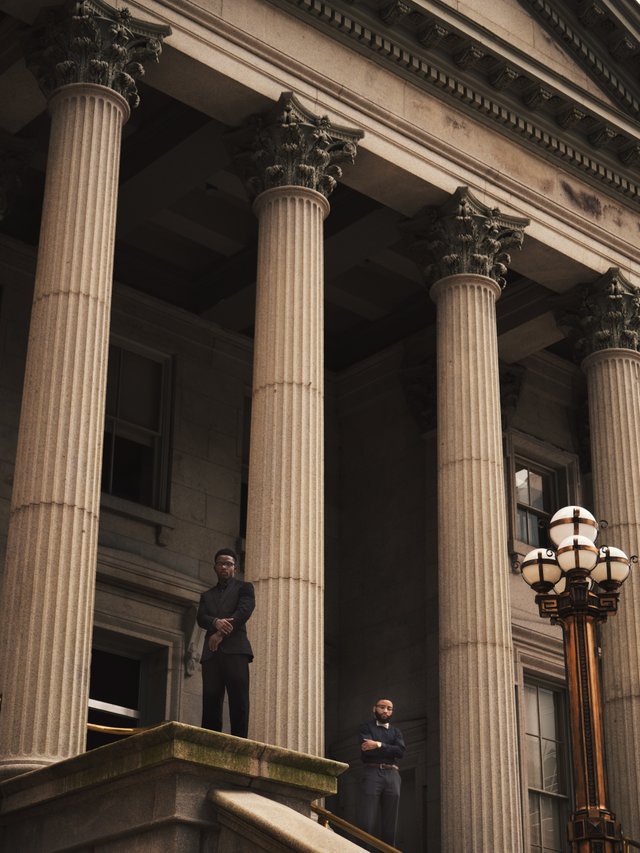Steemit Basic Income Giveaway (Rules and Laws)

Wow, last week there was a huge range of hobbies and interesting things that keep people relaxed and ticking over! Lot's of interesting and usual things, in addition to the more normal ones of exercise, reading and gaming!
This week, I'm writing this post a couple of hours early. The usual problem of a non-sleeping toddler combined with a sick wife means that I probably won't have time later when the post actually clears payout.

This week, I've been thinking about rules and laws. Mostly because I collected a hefty fine for running a red light by accident (I was tired and was looking at the wrong lights...). I know full well that I can't really appeal it, as I DID run the red light, and that is the problem, and not that I was tired and stupidly went through. I'm not a lawyer, but I'm pretty sure the law doesn't allow stupidity and tiredness as a valid defense.
So, this got me thinking about laws and rules in general. Do people see them more as guidelines or something that is concrete? So, on the road, a good chunk of the population see the road rules (laws) as guidelines, breaking the speed limits and various other rules with regularity. Other things, like murder are more concrete, it's generally not okay to kill other people.
Obviously, when we are on the receiving end of the law (like I just was), there is all sorts of reasons why the law is unjust and so forth. However, when you are protected from harm by the law, then it is the most incredible instrument of justice in the world. Obviously, there can be a range of good and bad laws, and there is a wide range of interpreting the laws (that's why we have judges and lawyers...) and so there is a vast middle ground of cases where the laws are at best unclear and need to be tested.

My question
Do you think, in general, that rules/laws should be concrete or treated more as guidelines?
(optional) Can you think of a rule/law that should be abolished (gotten rid of) or created?

My sample answer

I personally think that laws should be treated (in general) as concrete. Generally, there are there for a greater good reason, and if that means occasionally holding back a few then that is okay with me. On the other hand, that is not to say that there aren't bad laws/rules but in that case, the constant misapplication of the laws should lead to public outcry for change. Also, the concrete enforcement of the law doesn't rule out a leniency in the application of the punishment for breaking the law either.
Personally, I think people who push in front of lines should be fined, pilloried or jailed, or people who use their phones or are really loud in the silent carriages of trains/public transport or people who try to board the plane when it isn't their turn, but I guess that these rules would be impossible or difficult to enforce!
Keep in mind that I'm thinking about this from the perspective of someone who has lived in a Western democracy (Netherlands and Australia) for my whole life, so this is my experience of laws/rules. I understand fully that other people's experiences will depend on their own personal background...

Rules
- Upvote if you want, it increases the payout and then I can hopefully sponsor more people.
- Resteem is NOT neccessary, but the more people see this, the more the people will be likely to be sponsored.
- In the comments, tell me your thoughts about rules/laws.
- I have added a small Steem-Bounty to the post, so that everyone who replies with a valid entry will get something back. If I give your post a small upvote, it is valid (also, subscribe to @dustsweeper for maximum benefit!).
- I will be sponsoring as many people as this post pays out in liquid SBD/STEEM. Also I will kick in at least the required amount to round up to the full number. Winner is by random generator after a shortlisting of quality comments!

Steem Basic Income
One of the first communities that I came in contact with at the beginning of my time at Steemit was @steembasicincome. As a beginning author, Steemit can be a daunting place. It feels like you are posting into an abyss with no ability to grow. Steem Basic Income gives you a guaranteed vote on one post a day, thus giving you a small but cumulative over time support to your account.
With this post, I want to help sponsor people who might not even have the spare 1 STEEM that is required for registration. So, when this post pays out, I will sponsor people depending on the payout of this post. Basically, I will round up the SBD payout from this post and then that will be the number of people I will sponsor. (So, if the payout is 2.3 SBD, I will sponsor 3 people).

Last week's winners
Last week paid out (I don't know exactly yet, but it is close to 2 shares), so I will make it 3 shares. I will send the SBI shares when the post from last week clears.
Congratulations to:
Upgoats by ryivhnn
Account banner by jimramones
The classical music community at #classical-music and Discord. Follow our community accounts @classical-music and @classical-radio. Community Logo by ivan.atman

Join us @steemitbloggers
Animation By @zord189

Posted from my blog with SteemPress : http://www.gamerjokerbreadder.com/2018/07/31/steemit-basic-income-giveaway-rules-and-laws/




A couple of years ago I was speeding down the M7 from Dublin to Tipperary(it is a long way actually! ). I heard the siren. I started thinking of excuses ... wife in labour , late for work , something. So when I opened the window I was about to blurt out my excuse but the cop got there before me . “Trouble taking off ? Wing commander!.” All my excuses went from my head and I just started laughing. He issued me a summons and I paid my dues. I told that story many times and it is well worth the 80 quid from the mileage I got out of that one . Anyway this leads me to my answer . I think without law , the world would descend into anarchy! Watch the film “The purge”. I know it’s fiction but it wouldn’t be far off the mark! But every law has exceptions and as @bengy said , that’s why we have lawyers and judges. But law is complicated ! Very complicated. When it comes to abortion laws there has to be a bit of give and take. Drawing a line in the sand just won’t cut it and you need some educated people to make an informed decision .

There is a law in Britain that a policeman has to offer his helmet if you have to make an emergency number 2 💩💩. I reckon this law could be abolished 😂😂.
Ahahaahahaha! That story really was worth the fine! I wonder if anyone has really tried to test out the helmet law... could have interesting results!
Or perhaps expanded to them being required to don helmet again post poop 😁
The winners and the next SBI Giveaway (Superpowers) is here:
https://steemit.com/steembasicincome/@bengy/steemitbasicincomegiveawaysuperpower-kk3c7w2ju9
I always viewed laws as black and white, but saw “rules and regulations” as more nuanced. I guess in the United States I would say laws are things where you get charged with a felony if you violate them, while rule and regulation infractions only result in a misdemeanor or a fine.
Having established that, I do believe that rules should be treated more as guidelines. I have always viewed them as a sort of mechanism to police intentionally bad behavior. A good example being speeding while driving, which is generally not enforced when everyone is speeding. It’s only when that one person starts going way faster than everyone else that he gets pulled over.
I think they are guidelines in that they set expected behavior, and provide a means to punish someone who goes way over the line. To use your cell phone example: I have been in doctors offices and other places that have signs that say “no cell phone use”, and yet I have often quietly gone ahead and used my phone anyway. No one has ever said a word to me, because I am courteous and I remain aware of my surrounds and responsive when I’m called to the desk or when the queue moves forward. But if someone else were on their phone and they were being particularly loud or rude or simply oblivious to the world around them, the rule provides a mechanism to punish this person.
Bottom line: rules are not necessarily made to be broken, but they are made to be respected in the sense of the “spirit of the law” if not the letter.
It is a good example you give with the mobile phone (and I agree in part). However, couldn't someone who was loud and discourteous who was pulled aside for the rule-breaking have a cause for pointing at you and saying why wasn't he breaking the rule? Which could lead to a slightly more nuanced contrast, when have you stepped over the guideline? Where that line is, will depend on the person who is going to say something.
I park my car outside my garage, which is technically illegal, but none of my neighbours have a problem with it, as everyone does it (or the verges). However, last Christmas, someone did have a problem with it, and the entire neighbourhood got fined after they called police! So, in this case, the rule is enforced by the squeakiest wheel!
... also, about the speed limits. I live on a small road with a limit of 30kph, for good reason, there are limited sight lines and lots of kids and schools. However, there are many people who treat it as a "guide" and choose to race through at speeds that are much much faster! In this case, I would wish that the limit was more strictly enforced, as it is too late to be enforced after an accident...
...but it is good that you point out the difference between rule and law. I hadn't thought about that when I posted the question, I was just using the two words as synonyms.
Interesting examples, I can definitely appreciate them all!
You are correct, in the first example he most certainly point to me. In that scenario I would expect (and would comply with) the business asking everyone to put away their phones. This kind of hypothetical situation reminds me of the phrases “you’re ruining it for the rest of us!” and “this is why we can’t have nice things!” 😂
Definitely, give an inch....
Although, that is why we (as a society) constantly test the boundaries and interpretations of laws in court....
The winners and the next SBI Giveaway (Superpowers) is here:
https://steemit.com/steembasicincome/@bengy/steemitbasicincomegiveawaysuperpower-kk3c7w2ju9
Laws. Well,...
Laws.
I absolute think there are laws that shouldn't be. And laws that should be. I think it should be illegal for a society to force people into homelessness. It's hard to enforce something like that, because you're making a law for the government to enforce on itself.
I was just reading an article in the Los Angeles Times about people getting evicted from their homes because a group of investors had bought the building and was raising the rents. The people living in this building did not have the money available to them to let them move to a new place, so many of them were facing homelessness. And I feel just helpless in the face of knowing this happens. I often imagine what I could do to solve these problems if I had, say, Jeff Bezos' wealth. Snap your fingers, build a giant apartment building, and offer free apartments to people who are displaced all over the city... which would probably put some much needed downward pressure on rents all over this city.
But I don't have his money, and there's no financial incentive for him to do that, and he didn't get his money by being charitable in the extreme, you know? We cannot expect billionaires to solve the problems created by the economics that made them billionaires.
And so, we turn to laws. I digress?
Are laws guidelines? Not generally. Should they be? No, not if they are just laws. But so many of them aren't just laws and are applied irregularly. People of color are more likely to receive harsh sentences for the same crime than white folks. (https://www.washingtonpost.com/news/wonk/wp/2017/11/16/black-men-sentenced-to-more-time-for-committing-the-exact-same-crime-as-a-white-person-study-finds/?noredirect=on)
I... it's a big topic. There are my 3 cents worth.
LOL, 3 cents! that's more than most people's 2!
...but on a more serious note. You can do that in America? Evict people without finding them housing? In the Netherlands, if something similar happened (or if someone bought a house that already had tenants), the tenants have the right to stay, or be relocated to a similar housing (I think that this bit would have to be negotiated).
Yep, and it happens all the time. It should absolutely be illegal.
I just also digested the last bit (I got stuck on the first part of your answer). Yes, the problem of unequal application of laws is also a big problem. I was also thinking of the proportional penalties. For instance, a particular fine (lets say 100 euro), is nothing to one person and a disaster to another. On the other hand, making it a percentage of income would introduce it's own perverse incentives....
Exactly! To musk, a parking ticket isn't a deterrent. To someone else, it's the beginning of the path to homelessness. We have to solve our world's income inequality before we can even begin to figure out how much a parking ticket should be. maybe a judge should decide, but bias is a whole nother ball of wax
Posted using Partiko Android
The winners and the next SBI Giveaway (Superpowers) is here:
https://steemit.com/steembasicincome/@bengy/steemitbasicincomegiveawaysuperpower-kk3c7w2ju9
Thanks! What a great regular contest! We should still chat about parenthood sometime. He had a rough napping day today, and finished the day with tiny little laugh/cry/cough sounds like a metronome. Very silly.
This discussion sort of reminds me of the debate whether the Constitution of the United States should be interpreted literally or broadly.
The law I think should be modified is the classification of cannabis as a schedule 1 drug. I wish it were treated similarly to alcohol.
This is just my opinion, I don't mean to offend anyone. Several states have already legalized it and I don't think it's total anarchy there. It is probably going well. Since it is decriminalized less spending goes toward processing would-be delinquents. Furthermore, the local government can tax it now! This doesn't really benefit users but it does incentivize other state governments to decriminalize the drug and make revenue from it. From experience, I'd say that without a doubt cannabis is the least psychoactive drug out of all the schedule 1 drugs. It would be inappropriate to call it the "safest" illegal substance, but while under the influence, one has the most control compared to other "harder" drugs. Just like any drug, whether it be over the counter or not, one should avoid operating machinery.
It is a little bit like that! Although, I would argue (from what I know of the United States Constitution) that that sort of high level documentation should be more a guide for the specific laws that are actually needed to govern. Sort of like saying, you shouldn't lie, but sometimes it is necessary, just not all the time! That and the fact that the document (whilst being well meaning) was written in a completely different age, and shouldn't be read too literally, especially as we know that the evolution of language renders a modern interpretation of the literal words risky.
To be honest, I can't speak of cannabis, I'm afraid I just don't know enough research about it to comment with any certainty! However, I do know about alcohol, and whilst enjoying the occasional drink, I would have to say that it's negative impact on society is probably far worse than the softer recreational drugs.
The winners and the next SBI Giveaway (Superpowers) is here:
https://steemit.com/steembasicincome/@bengy/steemitbasicincomegiveawaysuperpower-kk3c7w2ju9
Thankyou for the steembasic income for last weeks post. I don't have a good answer for you on this one. I work in pharmacy where I am beseiged by rules and regulations. I do my best to uphold them, but I wish dearly that there were less or at least that they all made sense.
No problem!
Well, I guess there are good reasons (I hope) for when you are dealing with drugs to have rules! I'm sure all of them made sense at some point in time when they were individually created, however, probably the combination of all of them makes for a messy soup!
The winners and the next SBI Giveaway (Superpowers) is here:
https://steemit.com/steembasicincome/@bengy/steemitbasicincomegiveawaysuperpower-kk3c7w2ju9
Hello that was a good read. This is a interesting question but for me has a very simple answer. Laws have to be looked at as concrete. Laws in general are need to help form a society. If your group of people are big enough to need any form of Government or leadership body they are going to set some rules and if they are not followed and nothing happens they they won't form the society that the group is trying to form. No this doesn't mean that i think all laws are good or that all punishments are correct. Say running that red light. That was a clear case of breaking a law but the goal of that law is to avoid people getting hurt in traffic accidents so should the punishment really be to pay a lot of money? That is where I start to disagree with how we do things. I real feel public service should be used a lot more as a punishment than money. A fine mean nothing to a rich man and everything to a poor man. Time spent helping your community would be equal teach a lesson and help the community. I really feel that monetary punishment should be used much less. We teach our children when they do something wrong but when we grow up we stop thinking we have things to learn.
I really agree with your idea of the size of a community needing to have rigid laws to bind the society. At smaller scales you can probably get away without much, but we don't have those sorts of societies anymore!
I was taken by your idea of community service as "punishment", the more I think about it, the more sense it makes than having a monetary fine. Although, that said, I would also argue that time is not an equal resource either... a single parent that is racing around with kids, would have much less spare time (that might need to be bought with babysitting/creche) than a person in a secure job with paid leave.
You make a good point with the baby sitting but I would assume that wouldn't matter as often as most public service is during the day when you kids would be at school or in a day care assuming you worked. If you are a stay at home parent then yes some deal might have to be made.
The winners and the next SBI Giveaway (Superpowers) is here:
https://steemit.com/steembasicincome/@bengy/steemitbasicincomegiveawaysuperpower-kk3c7w2ju9
I think laws should be treated as guidelines. When laws are very concrete and can only be applied by their strictly literal meaning, it is very easy for people to find legal vacuums and get unpunished. However, I have to admit that this approach also has disadvantages, because it makes law application subjective.
I propose the creation of a law that forbids the spread of information about terrorist group demands and actions. Expression through violence should not be allowed.
I think your first point touches on an important question when forming laws. Is it more important to catch the guilty or to avoid punishing the innocent? The settings you apply to this question is quite important, I would argue a balance towards the second option.
Whilst I agree with the sentiment of non-violence, I'm not sure a law like that would not have unintended side effects. First and most important of all, what and who defines a terrorist organisation?
A terrorist group is an organization that uses or promote the use of violence to achieve their aims. A court should create a list of terrorist groups. Most of these groups publicly announce their intentions, so they can be identified easily.
The winners and the next SBI Giveaway (Superpowers) is here:
https://steemit.com/steembasicincome/@bengy/steemitbasicincomegiveawaysuperpower-kk3c7w2ju9
The problem with concrete laws are we already have too many of them. You can't go through your day without breaking one you didn't know that existed We have too many laws on the books.
The federal goverment can't count how many laws it has spread of 50 titles of the US code cover 27,000 pages not to mention the statutory code. Best estimates are around 10,000 Federal laws not to mention state and local.
source
Here are a few of the crazy ones still on the books.
source
Massachusetts: Any person caught eating peanuts in church may be jailed for up to one year
Alabama: One is not allowed to play dominoes on Sundays
Concrete laws like this can be used to target individuals.
It's weird that those archaic laws aren't exercised from the books! I guess you argue that they don't cause harm if they aren't enforced, but the possibility of enforcement is plain weird!
I guess these things start to grow and evolve as new situations arise or new challenges are made to them, in a similar way to how computer coding can start simple then start to get out of hand for really large systems! But that is even more incentive to remove the useless ones!
The winners and the next SBI Giveaway (Superpowers) is here:
https://steemit.com/steembasicincome/@bengy/steemitbasicincomegiveawaysuperpower-kk3c7w2ju9
Well, about the creation and use of laws, I don't disagree entirely at a first glance, but I would question and think, if isn't there a better way to live in society. When came the time to use or apply some law, maybe we already failed to avoid the source of that behavior or situation at the first place, or we simply didn't design all the conditions and variables required to aim in a different direction or result.
In this context, I like the most part of the J. Fresco's view on this:
Definitely, if the law has been applied, then there is something potentially more wrong with the system (maybe poverty or bad education or poor future prospects) than the actual breaking of the law. However, I would have to say that past conditions shouldn't excuse present actions. They can help explain them, and educate us further on how to avoid the contributing factors in future generations or to help avoid the same situation with the same person again...
The winners and the next SBI Giveaway (Superpowers) is here:
https://steemit.com/steembasicincome/@bengy/steemitbasicincomegiveawaysuperpower-kk3c7w2ju9
I think laws should be concrete, but that they should allow leeway for a limited number of well-defined fringe cases.
I say concrete, because if everyone can bend the laws, depending on their situation, then they won't be effectively enforced. People can just ignore them, because the consequences of violating won't always be applied.
However, since we all know that there are situations when following the law is not always the best option, then it will be more realistic if the law identifies those instances (fringe cases) where violating the law will not be punished. The law just has to be clear on what those fringe cases are and be strict in making sure that people aren't always toeing the line and redefining the fringe cases.
For example, the law says pay your taxes and pay them on time. We should all pay taxes on time. And tax evaders should be punished. The same goes for late filers, who are punished with severe penalties. But the IRS will not punish you, forgiving your penalties if you can show reasonable cause for your late filing and have the proof to back it up.
So this way, the law is concrete, but it has a pre-defined list of cases when the law can be violated without suffering the consequences.
Yes, it is the edge cases where we need guidance from lawyers/judges to try and get the best interpretation on what is in the end, an imprecise wording of a social norm. To paraphrase: we know it when we see it... I think I really do agree, the law is violated, but the punishment can be muted and witheld.
Exactly. I'm not a fan of too many laws, myself. But the reality is, once a law is in place, we have no choice but to follow. The only recourse we have is to make sure that we can escape punishment once we fall into those grey areas where violating the law is the only/right choice.
The winners and the next SBI Giveaway (Superpowers) is here:
https://steemit.com/steembasicincome/@bengy/steemitbasicincomegiveawaysuperpower-kk3c7w2ju9